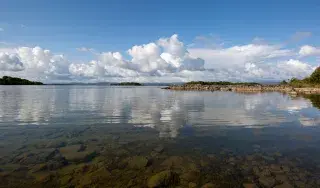DkIT Study Indicates that Lake Temperatures May Rise At Alarming Rate Over Next Century
Climate change is causing “lake heatwaves” to become more frequent, intense and long-lasting, a new DkIT study warns.
Lake heatwaves—periods of extreme warm surface water in lakes—may increase in intensity and duration by the end of the twenty-first century, suggests a modelling study completed by Dundalk Institute of Technology (Institute) researchers which was published this week in Nature. The study indicates that, under a high-greenhouse-gas-emissions scenario, the average duration of lake heatwaves could increase by around three months on average and some lakes may reach a permanent heatwave state.



The increasing frequency of heatwaves over land and the sea surface has been linked to global warming. However, less is known about lake heatwaves and how they will be affected by global warming. Lake ecosystems are vulnerable to temperature changes, and how lakes respond to global warming affects the organisms that depend on these environments.
Iestyn Woolway, a former Research Fellow at the Centre for Freshwater and Environmental Studies at DkIT together with other colleagues modelled the impact of heatwaves on 702 lakes from 1901 to 2099. They found that under a high-greenhouse-gas-emissions scenario (RCP 8.5) the average temperature of lake heatwaves is likely to increase from about 3.7 degrees Celsius to 5.4 degrees Celsius, while the average duration will increase from approximately a week to more than three months by the end of the twenty-first century. Under the most conservative emissions scenario (RCP 2.6), the average increases in temperature and duration are around 4.0 degrees Celsius and one month, respectively. The authors included lakes up to 60 metres deep in their projections and found that heatwaves would be longer lasting but less intense in deeper lakes. The project was funded by the European Union’s Horizon 2020 research and innovation programme under the Marie Sklodowska-Curie Action Individual fellowship scheme.
Speaking about this issue, Iestyn said,
“Lake temperatures are set to rise faster than the ability of some species to disperse to cooler areas. The consequences will be more serious for species that disperse less readily, such as freshwater molluscs, but even more motile species, such as some fish, which could migrate more rapidly are likely to be restricted by physical barriers. This could cause catastrophic damage to some lake ecosystems, which may have irreversible impacts on ecological communities, as well as have a dramatic influence on local communities which depend on lakes for survival”.
Dr Eleanor Jennings, a co-author on the study and Director of CFES at DkIT, adds that knowledge about lake heatwaves by itself is “not enough” and that it must be translated into action :
“Knowing that very dramatic and extreme changes may occur is not enough. This knowledge must translate into individual and government actions if even some of the most extreme consequences for lakes, and the species that live there, are to be avoided.”
Dr Tim McCormac, Head of Research & Graduate Studies at DkIT,
“I would like to commend to work of my colleagues in the Centre for Freshwater & Environmental Studies. This is a comprehensive study which underpins our prioritised research area of Energy and the Environment. The study provides important new knowledge and insights that can help inform policy around climate change and support the protection of our lake ecosystems which are vital for the preservation of our planet’s biodiversity. Nature is a world leading multidisciplinary science journal and its publication of this new study is a fantastic endorsement of the work of the CFES team and speaks to the calibre of its findings.”
As lakes warm over the twenty-first century, heatwaves will extend across all seasons and some lakes will reach a permanent heatwave state, the authors suggest. Increases in heatwave events could threaten lake biodiversity and push ecosystems to the limits of their resilience, they conclude.
The study was published in the journal Nature.



